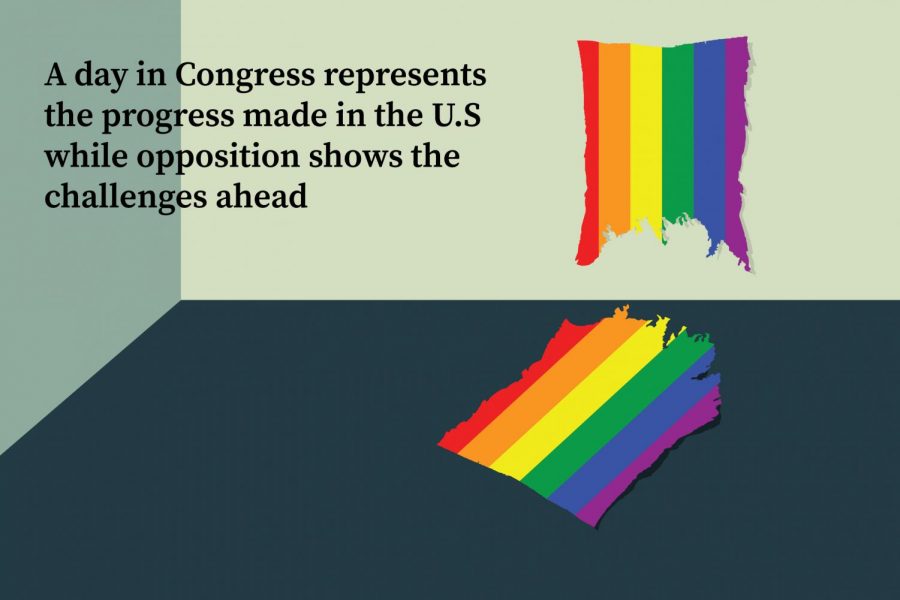A day in Congress represents the progress made in the U.S while opposition shows the challenges ahead
March 16, 2021
On Feb. 25, the House of Representatives passed monumental legislation while the Senate debated the possible confirmation of the highest ranking transgender American in government, demonstrating the social progress made in the United States, while also showing the challenges that lie ahead.
The legislation passed in the House is known as the Equality Act, a bill that, if signed into law, would amend the 1964 Civil Rights Act to include protections for the LGBT+ community against discrimination. It has been proposed in Congress multiple times dating back to its original introduction in 1974, yet the bill had never succeeded in passing either house of Congress until 2019.
Supporters of the bill celebrated the historic occasion, heralding the bill’s passage as a sign of social progress in the United States. The bill also faced fierce opposition as well from members such as Representative Marjorie Taylor-Green (R-GA). She had posted a video to her official Twitter account of her placing a sign parroting an inaccurate and transphobic statement saying “There are TWO genders: male and female. Trust the science!”
The science doesn’t agree with her, as organizations including the American Medical Association, have embraced a view of gender as a spectrum rather than a binary. Taylor-Green’s actions were meant to stigmatize the transgender community and prevent non-discrimination policies from being put in place. Yet the general public doesn’t agree with her on this front. Polling from PRRI in April of 2019 found that 71 percent of Americans favor laws that would protect gay, lesbian, bisexual and transgender people against discrimination in jobs, public accommodations and housing.
The bill passed along a near party line vote, with every Democrat and three Republicans voting in support of it. The vote presented a clear summary of the political polarization on LGBT+ rights, with the Democratic Party largely supportive of equality measures and nearly all Republicans standing in opposition. The tension between making history and transphobic opposition was present elsewhere in Congress.
On the opposite side of the Capitol, the Senate was taking up the confirmation of Dr. Rachel Levine, President Joe Biden’s nominee for assistant secretary of health. Levine would be the highest-ranking member of the government to be openly transgender if confirmed by the Senate. During her confirmation hearing, Senator Rand Paul (R-KY) brought up claims of children en masse falsely identifying as transgender and compared transitioning to genital mutilation.
Neither Paul nor Taylor-Green supported their claim with scientific evidence, but it didn’t matter. Taylor-Green was explicitly denying the existence of transgender people, while Ryan was spreading harmful misinformation. Their goal is to delegitimize trans people and to keep their access to basic human rights framed as a political debate. People are fighting for progress against opponents who won’t even acknowledge they exist.
Public opinion has shifted away from Paul and Taylor-Green’s perspective, so they resort to lies and fear-mongering. Currently, 67 percent of Americans support gay marriage, according to Gallup polling from 2020. Further polling conducted by PRRI in 2019 found that 63 percent of Americans would be comfortable if their friend came out as transgender. Growing majorities of Americans are accepting of LGBT+ people and support guaranteeing equality under the law. Paul and Taylor-Green are ignoring public opinion and reality as they push transphobic beliefs.
There are those who will continue opposing attempts at equality out of a general disdain for the LGBT+ community. In the United States, these policymakers are decidedly in the minority, and in a representative democracy such as our own, it should be the views of the majority that set policy. Contemporary conservative arguments are acutely aware of this fact, they know that they have lost public support, so all they are left with is lies.
That is why we see efforts like those trying to restrict access to public bathrooms; it demonizes transgender people and is constructed on a lie. While advocates will claim that predators will pretend to be transgender so they can gain access to victims, this has been disproven. A 2018 study from the Williams Institute at UCLA School of Law titled Gender Identity Nondiscrimination Laws in Public Accommodations: a Review of Evidence Regarding Safety and Privacy in Public Restrooms, Locker Rooms, and Changing Rooms compared areas with open bathroom policies and those without, and found no link between relaxed policies and crime levels.
“This study finds that the passage of such laws is not related to the number or frequency of criminal incidents in these spaces,” researcher Amira Hasenbush said.
While it might be difficult to see constant attacks and hateful smear campaigns, it would be wise to remember that a committed movement can overcome anything. The Equality Act may ultimately die in the Senate, but that speaks more to the flaws of our system of government and less about public opinion. Indeed, Americans have increasingly shown that they are supportive of the LGBT+ movement.
While it might seem that achieving full social, political and economic equality for LGBT+ people is an unattainable dream, we only need to look at history to see marginalized communities securing rights that once seemed out of reach. A century ago women didn’t have the right to vote, now they vote at higher rates than men. Suffragettes were viewed as extreme figures who could upend society, now it is entirely normal for women to vote.
The fight for LGBT+ equality is seen as radical, but someday we will question how these rights were ever up for debate.















